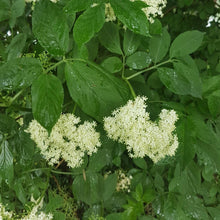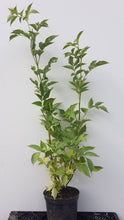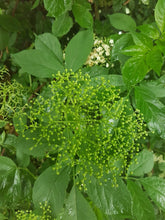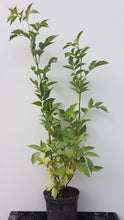Characteristics
The black elder bears the botanical species name Sambucus nigra. In German-speaking Switzerland, Sambucus nigra is also called Holler. In northern Germany the black elder is also called black lilac. It can reach heights of 3-7 meters and widths of 3-5 meters. It is characterized by its spherical and spreading growth. The black elder is therefore a large shrub.
Pollination and foliage
Sambucus nigra is monoic Both insect pollination and cross-pollination are possible. The black elder can be easily recognized by its white or pink flowers that bloom in June. The opposite leaves are characterized by unpaired plumage and a serrated leaf edge.
Soil condition
Sambucus nigra prefers moderately dry to moist soils with a high nutrient content. An alkaline to slightly acidic pH value is also very well accepted in addition to a humus-rich, loamy and calcareous soil. In case of doubt, Sambucus nigra can also come to terms with suboptimal soil conditions. The black elder is frost hardy up to a temperature of up to -20 degrees and can therefore also be defined as a relatively frugal and therefore low-demanding plant.
Provenance
The black elder is a type of shrub that is particularly common in Central Europe. However, Sambucus nigra can also be found in the Caucasus, Asia Minor and the regions of Western Siberia. In the Alps, the black elder can be found at a maximum altitude of 1,500 meters.
Uses
The fruits of the black elder are particularly popular. However, these should only be consumed when they are heated. Otherwise there is a risk of digestive problems. This is why, for example, the production of products such as elderberry juice is ideal. It can also be used as a dye in addition to the production of wine. The fruits of Sambucus nigra are also very popular in the pharmaceutical industry.








